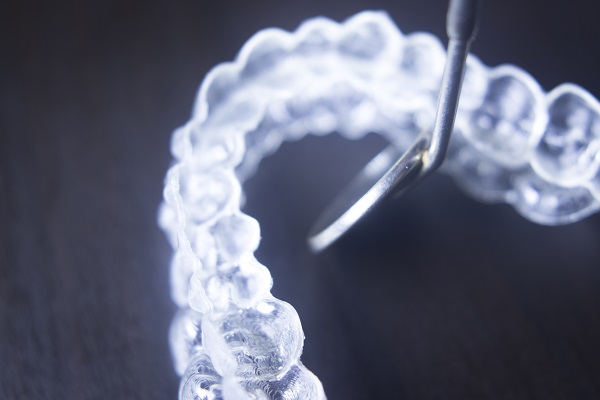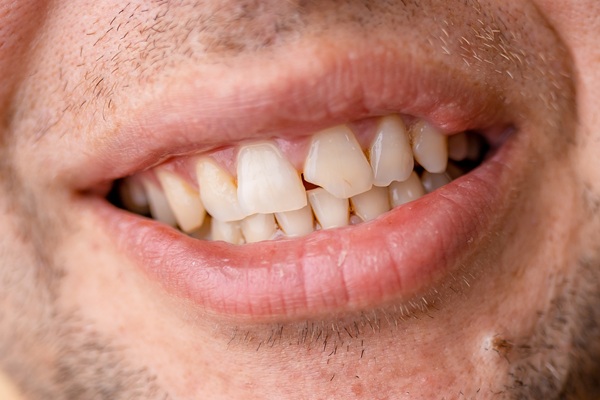What Types of Issues Does Invisalign® Fix?

Clear aligners, such as Invisalign®, have become a popular option for adults who desire to improve the appearance of their smile, but do not want to wear traditional braces. Much of the appeal owes to the more subtle cosmetic appearance of the appliance; however, Invisalign® has also proven to be an effective treatment for many dental issues.
Issues that Invisalign® can treat
Invisalign® uses successively tighter-fitting sets of clear aligners to gradually move teeth into the desired position. These aligners can be used to treat many of the same issues as traditional braces.
Crooked teeth
Many people are motivated to correct crooked teeth by cosmetic concerns. However, crooked teeth can also cause excessive wear, jaw pain, difficulty cleaning teeth and other dental problems.
Overbite
An overbite is when the upper front teeth overlap the lower front teeth. Most people have a little overbite, but excessive overbite can cause problems with chewing and jaw pain.
Underbite
If a person's lower teeth stick out in front of their upper teeth, they have an underbite. Underbites are often caused by the lower jaw being too far forward. An underbite can cause premature or uneven tooth wear, chewing and speech problems.
Open bite
If an individual has an open bite, the upper and lower teeth do not meet. An open bite can make chewing and biting difficult.
Crossbite
When closing the mouth, if some of the upper teeth rest inside the lower teeth, it is called a crossbite. A crossbite can lead to tooth wear or chipping. It can also cause the gums to recede, which can lead to gum pain or bone loss.
Gaps between the teeth
When there is too much room in the mouth, gaps can form between teeth. Gaps can be a cosmetic issue and can also cause food to become lodged between teeth leading to gum disease and tooth decay.
Crowded teeth
When a person does not have enough space in the jaw, teeth can become twisted or overlap. The lack of space between teeth can trap food particles, which can contribute to decay.
Issues that Invisalign® can not treat
Clear aligners do not exert the same amount of force as traditional braces. Issues requiring large amounts of tooth movement, such as these three, may not be able to be treated with clear aligners.
Rotated teeth
Overcrowded teeth can rotate. Teeth that are rotated past 20 degrees can not be treated with clear aligners.
Large gaps between teeth
Invisalign® can be used to close gaps that are 6 millimeters or less in size. Larger gaps need to be addressed with traditional braces or surgery.
Midline movements
Some people's front teeth do not line up with the midline of their faces. Invisalign® can only shift the front teeth 2 millimeters to the left or right.
Conclusion
Invisalign® can not eliminate the need for traditional braces in some patients. However, for many people desiring to improve the appearance of their teeth, they can be a good option.
Are you considering Invisalign® in the Lilburn area? Get more information at https://www.lilburnfamilydentistry.com.
Check out what others are saying about our services on Yelp: Read our Yelp reviews.
Recent Posts
Dental crowns are restorations that can address a range of dental issues, from severely damaged teeth to protecting a tooth after a root canal. They help preserve oral health and enhance a smile's appearance. In addition to being versatile, they are available in different materials, which can be helpful for individuals who want options.Dental crowns…
A broken tooth is a common dental issue that can happen for many reasons, such as accidents, biting into something hard, or untreated tooth decay. Whether a dentist can save a broken tooth or needs to remove it depends on how severe the damage is and how quickly patients seek treatment. While modern dental techniques…
Dental crowns are a popular dental restoration, effectively preserving and enhancing the function of damaged or weakened teeth. These custom-made caps are designed to fit over the existing tooth, providing both structural support and improvements in your smile's appearance. However, not all dental crowns are created equal. The type of dental crown you choose can…
Your dentist can help determine if you need dental crowns. There are many reasons for getting these restorations. The main goal is always to restore the tooth and enhance its functions. Here are the signs you may need dental crowns soon.Losing at least one tooth can cause more dental problems. It can lead to dental…


